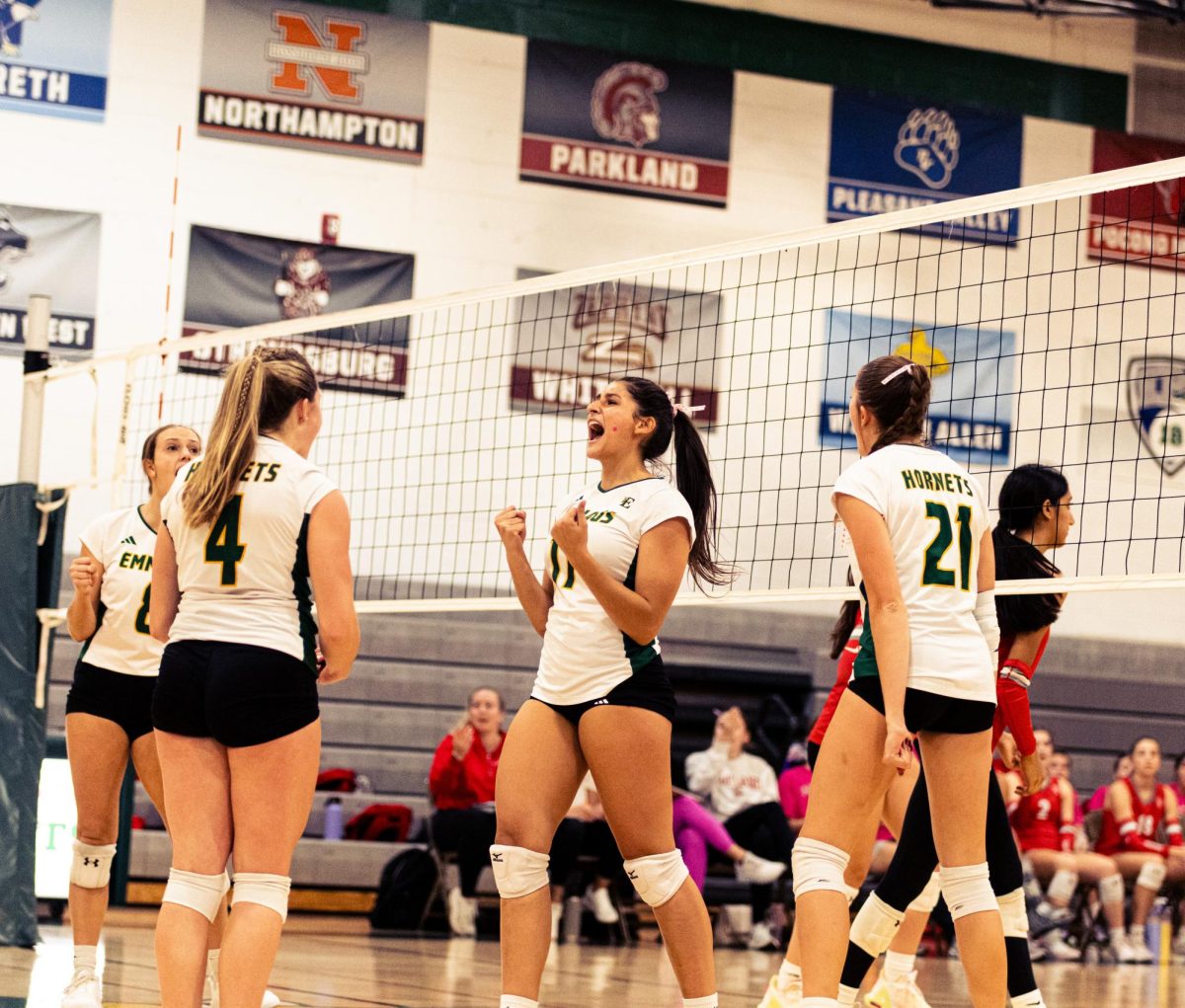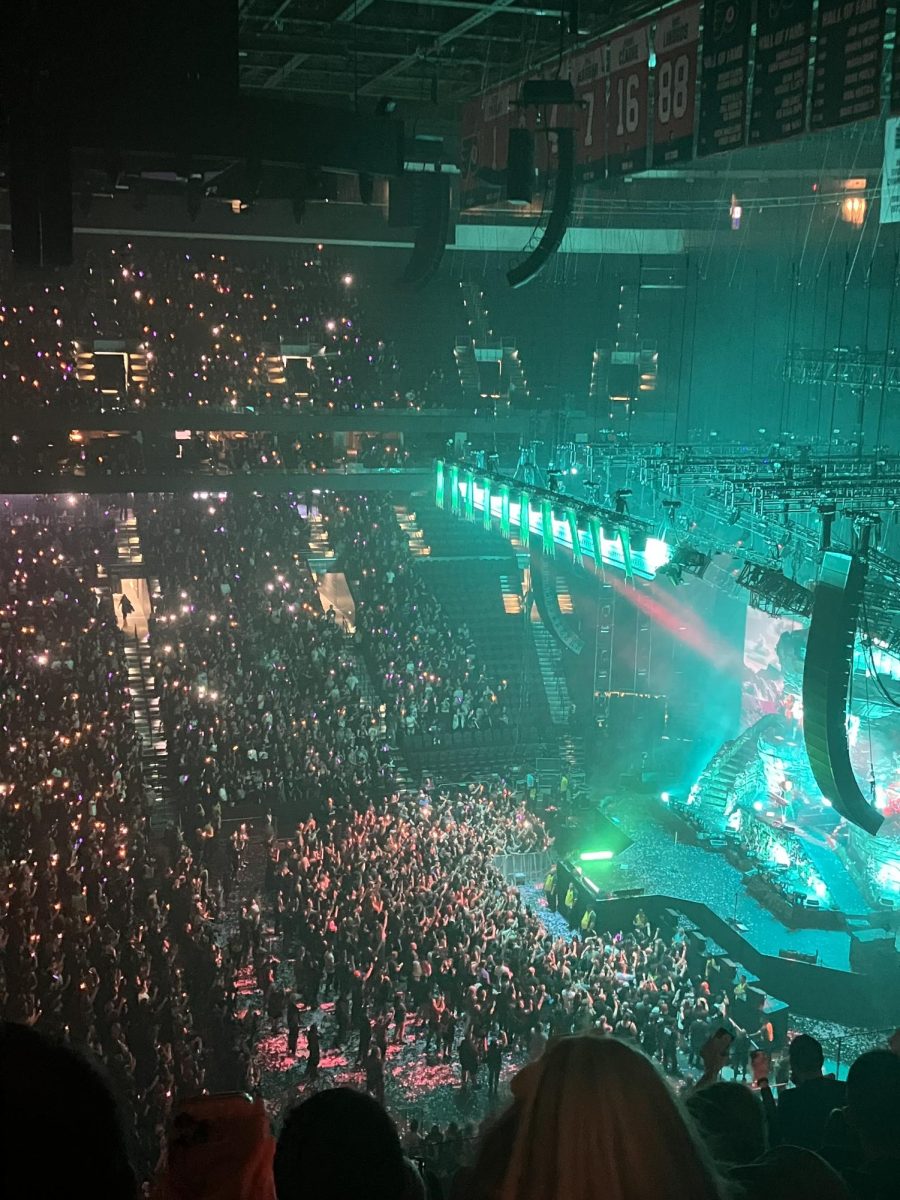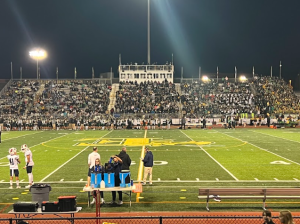Muslim students bring light to Islamic holiday of Eid al-Fitr
Jan 23, 2023
This previously ran in our December 2022 print issue.
With roughly 2.2 billion Christians in this world, it’s no surprise that Christmas is on the forefront for the world’s most popular holiday, but for the other 5.6 billion people, their own holidays may be viewed as inferior to the power of Ol’ Saint Nick.
For weeks on end, celebration anticipation and holiday cheer, swarm the media, businesses, and society itself. Christmas as a whole is such a driving force in the holiday roster that several students believe other holidays, such as the Muslim holiday of Eid al Fitr, is greatly overshadowed.
Eid al Fitr is an all-day celebration following the completion of the Muslim tradition of Ramadan, a holy month-long period of introspection, prayer, and fasting for Muslims. In some countries, Eid can last up to three days. Eid is a primarily a time for Muslim families to reconnect with both their relatives and their religion.
Despite Islam being the second most practiced religion in the world, many Muslims in the West believe that one of Islam’s most important holidays does not get the recognition and respect it deserves.
Senior Minhul Shoaib has spoken openly about issues concerning the lack of representation and education of Eid in the community.
“When I was in elementary school, my teachers would always ask why I’m not eating and I’m like ‘because I’m fasting,’” Shoaib said.” There’s less awareness about [Eid] and the fact that we [don’t] have the holiday off, so many Muslims have to take off every year [and] miss school, miss exams, miss any upcoming tests, just because they want to celebrate their religion.”
Shoaib also points out the impact the minuscule amount of education surrounding Eid can affect Muslim children growing up.
“When you’re growing up, that’s what shapes you and for me that definitely shaped me. I wanted to be white so bad. I was upset like, why am I Brown? Why am I not like everyone else?” Shoaib said. “I definitely feel like implementing this will help kids realize that it’s okay to be whatever they are. [Eid] should be represented because the East Penn District does have diversity and it needs to be included within everybody else.”
Junior Hamza Ashgar believes that the biggest issue during the holiday season is the lack of recognition for Eid.
“Right now, just recognize it as a holiday,” Ashgar said. “It doesn’t have to be a week off, just a day off just so that people know what it is. Everyone knows Christmas, but not a lot of people know what [Eid] is.”
After living in Pakistan for two years, Shoaib experienced first hand the difference between how the holiday is celebrated in the East compared to here.
“Since I act since I lived in a Muslim country for two years, it’s been like pretty different within like living there and living here. So over here, it’s just like a one day celebration; we just pray and then we just go to a bunch of family parties to celebrate Eid with our loved ones, Shoaib said. “But I know that over there, it’s a lot bigger and we have many events beforehand. We’ll have like the night before Eid; we’ll have lots of stalls and then [for] three days we’ll just have celebrations [and] go to Eid prayer.”
Shoaib says that in the East, Eid is celebrated to the standard of Christmas in the way that students get close to a week off of school and parents off work, to participate in the holiday.
“Schools will give kids almost a week off for Eid; businesses will shut down just for Eid. They’ll be like holidays all over, which obviously over here it’s not common,” Shoaib said. “The regions that have more Muslims like in New York and Philly and Virginia and Maryland, all states that have a higher Muslim population, for them, it’s a lot more celebrated. Some of these districts also give off because they know that Muslims have to have off on these days.”
Shoaib finds the lack of accommodation for the holiday appalling due to the fact that not having off of school for Eid forces Muslim students to chose between their religion and their academics.
“Let’s say like someone had a really big test that day or had a big lesson that day, like now [Muslim students] have to sit there and just think about ‘should I go to Eid prayer or should I stay at school?’” Shoaib said. “And no one should have to make that decision when everybody else has the choice of relaxing [and] enjoying their holidays. When Yom Kippur has off and Christmas has off, when we have like 10 million holidays we give off [for,] we should definitely recognize that [Eid] needs to be given off as well. We shouldn’t make kids choose between two very important things in their life.”
Ashgar has faced similar issues when choosing between celebrating Eid and attending school.
“Pretty much my entire life I’ve always had to skip school in order to celebrate my holiday, which I think, you know, is unfair, considering we get like Jewish holidays off and Christian holidays off. Why not [Muslim holidays]?” Ashgar said. “You know Islam is the second biggest religion, to be fair.”
Ashgar and Shoaib have a strong belief in religious acceptance and believe that Emmaus should do the same for all religions’ major holidays, especially Eid.
“I believe that all religions should be represented and with Emmaus [having a] diverse population, I definitely feel that they should try their best to make kids feel included,” Shaoib said. “Since many are not aware of what Eid is, having Eid as a holiday will spread awareness throughout most of the area and let [people] know [Muslims] exist within our area [and they] matter.”
Because Eid does not land on the traditional holiday season, but instead rotates with the lunar calendar, Shoaib and Ashgar have both felt left out of the festivities.
“I’ve always felt left out because all my friends, they’ve been getting gifts over Christmas break, while I’m just sitting around [with] my family because we don’t we don’t celebrate Christmas or anything like that,” Ashgar said. “So, I just feel left out…, but it was a lot tougher when I was younger, you know, as a kid and looking back at it.”
Shoaib felt as if she needed to participate in Christmas traditions, just to feel included in holiday society.
“I always felt insecure; I always used to ask my parents ‘can we put up lights. I felt left out from all the traditions and just not having a tree and not being able to put lights up,” Shoaib said. “When I was younger, I didn’t understand that [because] obviously we don’t celebrate that.”
Growing up in America, Shoaib has alway pressured into conforming to the social norms of her environment during the Christmas season, and oftentimes, she felt disconnected from her own culture. It wasn’t until she moved to Pakistan for two years that she could immerse herself in her religion and the holiday of Eid.
“I always feel pressure; I love Christmas songs. I’ve definitely been very influenced by the culture here because obviously I’m American. I grew up American,” Shoaib said. “…living in a different country, it kind of gave me an idea of being able to appreciate my culture way more than I did before.”
Shoaib believes that recognizing Eid as a major holiday and giving it the respect it deserves, will allow for not only a stronger, more diverse community, but a newfound safety and sense of belonging.
“If the school is recognizing you, then it makes you feel safe and it makes you feel like you have a place in the school,” Shoaib said. “… it’s just enough for Muslims to feel more appreciated.”













